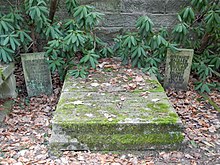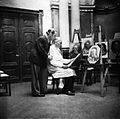Josef Herrmann
Josef Herrmann (born April 20, 1903 in Darmstadt , † November 19, 1955 in Hildesheim ) was a German opera singer . His voice ranged from bass to tenor . So he was not only referred to as a baritone , but also as a bass baritone or hero baritone .
Life
The father was chief engine driver for the Grand Ducal Hessian Railway, his mother came from the house of the "von Adelseck" (Adolfseck). Herrmann had a sister and a brother. As a child he sang in the children's and church choirs, as a teenager he took over solo parts in choral societies after a short time . He learned at the locomotive repair workshop Darmstadt the locksmith . After the Grand Duke of Hessen-Darmstadt became aware of Herrmann at a performance by the choral society, the latter granted him a scholarship , which enabled him to break off his apprenticeship against the resistance of his parents and with the Darmstadt professor Carl Beines and court advisor Paul Ottenheimer to begin training as a singer and actor. During his studies, he worked at the Darmstadt State Theater as an extra and stage worker. After first appearances in Darmstadt, engagements followed in Königsberg , Stettin and Nuremberg , others followed in Stuttgart , Mannheim and Karlsruhe , among others . Appearances in Milan , Bordeaux , Marseille , New York and San Francisco followed .
In Leipzig he met the soprano Margarete Düren , whom he later married and with whom he a. a. in Figaro's wedding and Undine stood on stage together.
In Dresden , at the height of his career, he was awarded the title of chamber singer. At the Semper Opera , he sang Freischütz , the flying Dutchman , in Die Meistersinger von Nürnberg and in Der Ring des Nibelungen .
After the war he went to Berlin , the first marriage was divorced and he married a second time. From this marriage there is a daughter. He was friends with the Dresden painter Fritz Leopold Hennig and the artist Manfred Luther . At the suggestion of FL Hennig, Herrmann gave his then wife Ursula Hennig (née Steinbicker) singing lessons (she later sang under the name Ursula Challier). Herrmann sang at all three Berlin opera houses: at the municipal opera in West Berlin , the Staatsoper Unter den Linden and the Komische Oper . For the reopening of the German State Opera on September 4, 1955, he was Hans Sachs . At the Komische Oper he sang the fairy tale king from Carl Orff's Die Kluge .
On medical advice, he went on a longer vacation, but died during the trip to Switzerland in a rest area in Hildesheim. His grave is in the Weißer Hirsch forest cemetery in Dresden. On August 15, 1962, a street in Dresden was renamed Josef-Herrmann-Straße in honor of Josef Herrmann.
theatre
- 1948: Carl Orff : Die Kluge (König) - Director: Walter Felsenstein - ( Komische Oper Berlin )
- 1955: Ludwig van Beethoven : Fidelio (Pizarro) - Director: Erich-Alexander Winds ( Deutsche Staatsoper Berlin )
Discography (selection)
- Dresden song recital. (Record: 1932-1946), BASF , Ludwigshafen 1975
- Great singers of the Dresden State Opera. German records, Berlin 1977
- Josef Herrmann - A Singer Portrait. (Record: 1939–1945), Fonoteam, Hamburg; Bellaphon Records, Distribution, Frankfurt (Main) 1979
- Josef Herrmann. 1. (Photo: Berlin, 1942–1944; Dresden, Leipzig, 1941; Vienna, 1943), 1979
- Josef Herrmann. 2. (Record: 1941-1943), 1979
- Great singers of the past. 2. [1984]
- Josef Herrmann. (Record: 1941–1943), Preiser, Vienna; Fono-Schallplattengesellschaft, Distribution, Laer [1995]
Web links
- Works by and about Josef Herrmann in the catalog of the German National Library
Individual evidence
- ↑ Stadtwiki Dresden: Josef-Herrmann-Strasse
| personal data | |
|---|---|
| SURNAME | Herrmann, Josef |
| BRIEF DESCRIPTION | German opera singer |
| DATE OF BIRTH | April 20, 1903 |
| PLACE OF BIRTH | Darmstadt |
| DATE OF DEATH | November 19, 1955 |
| Place of death | Hildesheim |





